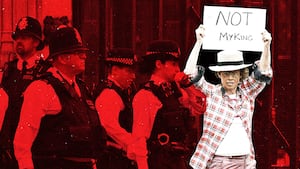Many “free speech” platforms host talk of violent insurrection, insidious conspiracy theories, and hate speech against minorities—but bare nipples are still a bridge too far for them.
Most sexually explicit and pornographic content is legal in the U.S., and engaging with such content on social media platforms lets people build communities and explore their identities. Yet the moderation of sexual content on mainstream social networks has made them the de facto arbiters of how people create and engage with nude content, both offline and in the digital space.
As a result, a crucial form of engagement for all kinds of users—including queer communities, sex workers, and other marginalized groups—has been removed and the voices of people with less power have regularly been shut down.
This should be where the self-proclaimed free speech paradises step in to fill the void, and provide the space for silenced voices to be seen and heard.
Parler claims to be “where free speech thrives,” Mike Lindell’s Frank Speech proclaims itself “the voice of free speech,” and GETTR calls itself a “brand new social media platform founded on the principles of free speech, independent thought and rejecting political censorship and ‘cancel culture.’”
However, GETTR’s Terms of Service (TOS) require user contributions to not contain any “sexually explicit, pornographic” content. Similarly, Frank Speech’s TOS prohibit “sexually explicit or pornographic material” from being posted on the site. Parler circumvents any wholesale prohibitions but requires sexual content to be tagged as NSFW (Not Safe for Work), thus limiting user access and free engagement.
Most sexual expression, even much of that which is deemed “pornographic” or “sexually explicit,” is protected under the First Amendment to the U.S. Constitution, which is, of course, the standard held out by many platforms as underpinning their commitment to free speech.
Another alternative social media platform, Gab, explicitly notes that any “written expression that is protected political, religious, symbolic, or commercial speech under the First Amendment of the U.S. Constitution will be allowed on the Website,” and a brief look at the “principles” page on the social network Minds shows that its content policy “is based on the First Amendment and governed by a community jury in order to minimize bias and censorship.”
Yet, both Gab and Minds exclude legal sexual content from being posted or shared.
These platforms are private entities and have every right under U.S. law to censor lawful content, and the government can’t tell them what they must publish. But positioning themselves as beacons of free speech (indeed, building their entire branding on that claim)—while limiting legal sexual content and ignoring the importance of truly ensuring full access to free speech and expression—is the height of hypocrisy.
Restrictions on sexual content are too often met with uncomfortable silence. There’s still a prudish undercurrent of feeling—unsupported by law—that such censored content is either marginally illegal (and so can be disregarded), or is undesirable that no one should even care whether it’s legal, or is so frequently censored that it’s not worth protesting the restrictions.
In a few scenarios, platforms have prioritized users’ interests over external pressure, such as when OnlyFans reversed its ban on adult content after significant pushback. Twitter and Reddit users also readily engage with legal sexual content and enjoy their right to free speech. Similarly, sex worker-run sites like PEEP.me and certain Mastodon servers take risks to defend sexual speech, and defend the First Amendment right to free expression.
But most major platforms still prohibit nude content, even those that market themselves as free speech havens. Sex workers, sexual freedom activists, and artists see significant censorship of their legal expressions across the web, and the hypocrisy between calling for more free speech and consequently censoring sexual content is one that is particularly noticeable on far-right sites like MeWe and Rumble—the latter of which is backed by the right-wing billionaire and early Facebook investor, Peter Thiel.
In fact, while these platforms claim to be more open and free than mainstream social networks, their TOS often are just scaled-back versions of the moderation used by Facebook and Instagram, where the de facto blanket bans on nudity affects all kinds of users—from those posting photographs of a 102-year old Little Mermaid statue, to creators posting their artwork depicting uncensored nipples.
The fact is, the system of content moderation remains badly broken, with policies that are opaque, often arbitrary, and applied unevenly. In censoring legal sexual content, these “free speech” platforms are not only sanitizing the digital space but displaying a fundamental ignorance of what freedom of expression actually means.
Until this changes, their “free speech” claims are just another marketing ploy.








